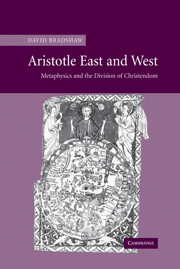Book contents
- Frontmatter
- Contents
- Preface
- 1 The Aristotelian beginnings
- 2 The Prime Mover
- 3 Between Aristotle and Plotinus
- 4 Plotinus and the theory of two acts
- 5 The Plotinian heritage in the West
- 6 Gods, demons, and theurgy
- 7 The formation of the eastern tradition
- 8 The flowering of the eastern tradition
- 9 Palamas and Aquinas
- 10 Epilogue
- Bibliography
- Index
9 - Palamas and Aquinas
Published online by Cambridge University Press: 22 September 2009
- Frontmatter
- Contents
- Preface
- 1 The Aristotelian beginnings
- 2 The Prime Mover
- 3 Between Aristotle and Plotinus
- 4 Plotinus and the theory of two acts
- 5 The Plotinian heritage in the West
- 6 Gods, demons, and theurgy
- 7 The formation of the eastern tradition
- 8 The flowering of the eastern tradition
- 9 Palamas and Aquinas
- 10 Epilogue
- Bibliography
- Index
Summary
The eastern tradition as we have presented it so far is rich but polyphonic. One finds terms as fundamental as energeia and “the things around God” being used differently by different authors, and concepts such as ceaseless prayer and the uncreated light achieving great importance without any attempt to incorporate them into a dogmatic synthesis. No doubt part of the reason was the strong sense of unanimity within the tradition as a whole. There was never any sudden loss of texts, or division into schools, or rise of a scholastic method – all factors that, had they occurred, would have encouraged authors to look for shortcomings within the tradition and to emphasize their own originality. The Byzantines took for granted that what had been said by the Fathers was correct and complete, and they saw their own task as that of applying this inherited wisdom to the issues at hand. Consequently, even a step of great originality was rarely heralded as such. Behind this conservatism there lay also a deeper cause, namely the apophaticism at the root of the entire tradition. What is the point of spinning out words about God when He can be known only through practice? On such a view theology, however complex it may become, is ultimately simply the enterprise of preserving “the faith once delivered to the saints.”
- Type
- Chapter
- Information
- Aristotle East and WestMetaphysics and the Division of Christendom, pp. 221 - 262Publisher: Cambridge University PressPrint publication year: 2004



